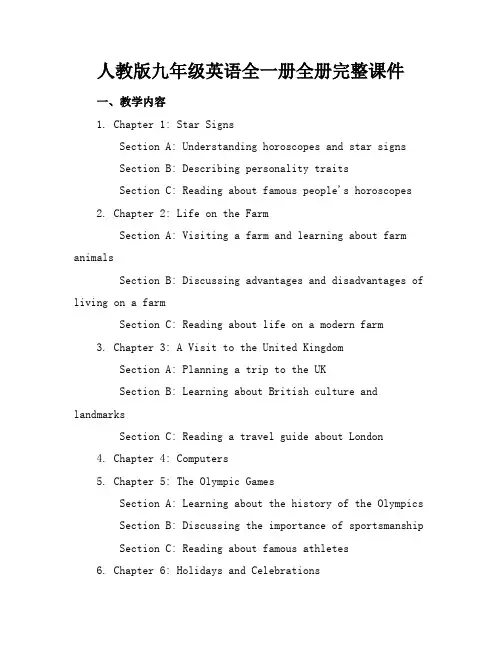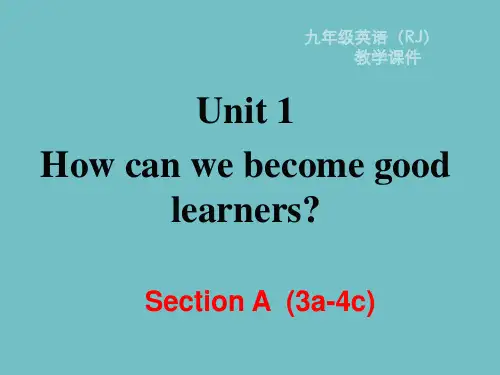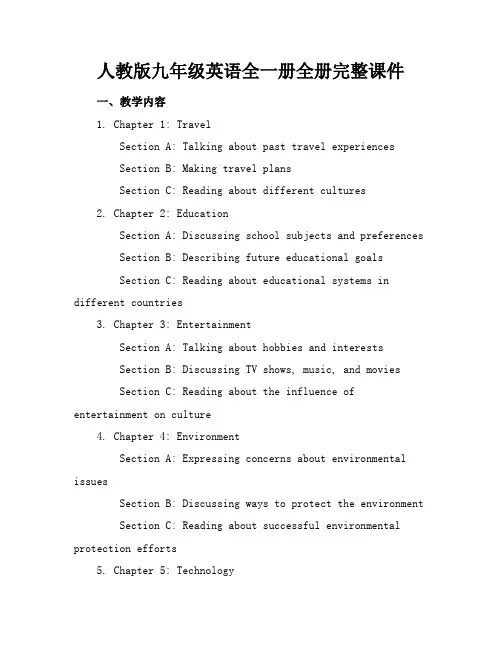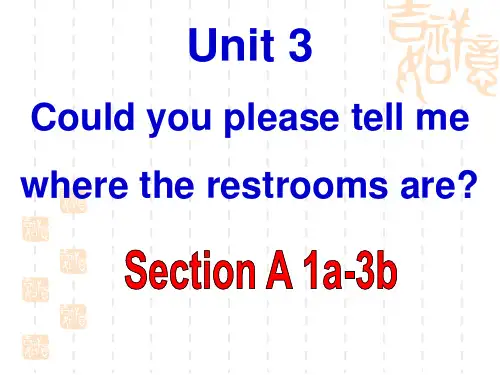人教版英语九年级上册完整全册课件
人教版九年级英语上册全部课件(优质)

Yes, I do. It helps my pronunciation.
You can read faster by reading word groups.
One way is by listening to tapes.
4a Match the questions and answers.
1. How do you practice speaking? ___c_____ 2. How do you learn new words ? ____e____ 3. How do you improve your writing? _____f___ 4. How do you practice listening? _____b___ 5. How do you improve your pronunciation? ___a___ 6. How do you learn grammar? ___d_____
4. I learned __u_s_e_f_u_l____ sentences like “It’s a piece of cake” by watching the movies.
5. I can find the meaning of the new words by looking them up in a _d__ic_t_io_n_a_r_y____.
2b Listening Listen again. Match each answer
below with a question above.
Questions
Answers
1. Does anyone learn English by watching
videos?
人教版九年级全册Unit1课件 (共25张PPT)

listening to music when learning
sleeping in class
talking with other students in class
They are not good habits for learning English.
1. What does “Practice makes perfect.” mean? Keep practicing. 2. If successful learners make mistakes, what do they often do? They learn from mistakes.
Read, study and learn about everything imporant in your life
Read Paragraph 3 and answer the questions.
Practicing and learning from mistakes Good learners think about what they are good at and what they need to practice more. Remember, “Use it or lose it.” Even if you learn something well, you will forget it unless you use it. “Practice makes perfect.” Good learners will keep practicing what they have learned, and they are not afraid of making mistakes. Alexander Graham Bell did not invent the telephone overnight. He succeeded by trying many times and learning from his mistakes.
人教版九年级英语全一册全册完整课件

人教版九年级英语全一册全册完整课件一、教学内容1. Chapter 1: Star SignsSection A: Understanding horoscopes and star signsSection B: Describing personality traitsSection C: Reading about famous people's horoscopes2. Chapter 2: Life on the FarmSection A: Visiting a farm and learning about farm animalsSection B: Discussing advantages and disadvantages of living on a farmSection C: Reading about life on a modern farm3. Chapter 3: A Visit to the United KingdomSection A: Planning a trip to the UKSection B: Learning about British culture and landmarksSection C: Reading a travel guide about London4. Chapter 4: Computers5. Chapter 5: The Olympic GamesSection A: Learning about the history of the Olympics Section B: Discussing the importance of sportsmanship Section C: Reading about famous athletes6. Chapter 6: Holidays and CelebrationsSection A: Talking about favorite holidays and celebrationsSection B: Learning about different cultural traditionsSection C: Reading about holiday customs around the world二、教学目标1. 学生能够理解和运用所学词汇和句型,描述个人和事物特点。
人教版九年级上册英语全册课件PPT

While-reading
How I Learned to Learn English
Last year, I did not like my English class. Every class was like a bad dream. The teacher spoke so quickly that I did not understand her most of the time. I was afraid to ask questions because of my poor pronunciation. I just hid behind my textbook and never said anything.
1) discover v. 发现
2) discover/ invent /find/ /find out/ create 的区别
①I discovered (that) she was a good cook. discover指_________ ,某种_________ ,而以前未被
发现的事物或未为人所知的东西。
九年级英语(RJ) 教学课件
Unit 1 How can we become good
learners?
Section A (3a-4c)
学习目标
➢ Key words & phrases:
expression, discover, secret, grammar, repeat, note, pal, physics, chemistry , memorize, pattern
人教版九年级英语全一册全册完整课件

人教版九年级英语全一册全册完整课件一、教学内容1. Chapter 1: TravelSection A: Talking about past travel experiencesSection B: Making travel plansSection C: Reading about different cultures2. Chapter 2: EducationSection A: Discussing school subjects and preferences Section B: Describing future educational goalsSection C: Reading about educational systems in different countries3. Chapter 3: EntertainmentSection A: Talking about hobbies and interestsSection B: Discussing TV shows, music, and moviesSection C: Reading about the influence of entertainment on culture4. Chapter 4: EnvironmentSection A: Expressing concerns about environmental issuesSection B: Discussing ways to protect the environment Section C: Reading about successful environmental protection efforts5. Chapter 5: TechnologySection A: Using technology in daily lifeSection B: Discussing the advantages and disadvantages of technologySection C: Reading about technological innovations6. Chapter 6: HealthSection A: Talking about exercise and healthy habits Section C: Reading about the importance of mental health7. Chapter 7: JobsSection A: Discussing dream jobs and career aspirationsSection B: Describing job responsibilities and qualificationsSection C: Reading about successful entrepreneurs8. Chapter 8: CultureSection A: Exploring traditional festivals and customsSection B: Comparing different cultures and promoting cultural understandingSection C: Reading about cultural exchange programs9. Chapter 9: SafetySection A: Talking about safety rules and precautions Section B: Discussing emergencies and natural disastersSection C: Reading about safety education10. Chapter 10: Life GoalsSection A: Sharing life goals and aspirationsSection B: Setting realistic goals and planning for the futureSection C: Reading about inspirational individuals二、教学目标2. Cultivate students' ability to read and understand different text types.3. Enhance students' awareness of cultural diversity and promote cultural understanding.三、教学难点与重点1. Mastering target vocabulary and sentence structures.3. Improving speaking and writing skills throughpractical activities and reallife situations.四、教具与学具准备1. Multimedia projector2. Whiteboard and markers3. Handouts with vocabulary lists, reading materials, and exercises4. Recording devices for listening activities五、教学过程1. Warmup: Engage students in a brief discussion about the topic of the day.2. Presentation: Introduce new vocabulary and sentence structures through reallife examples and practice dialogues.3. Practice: Provide students with practical activities, such as roleplays, group discussions, and writing exercises.4. Listening and speaking activities: Play audio recordings, and guide students to practice their listening and speaking skills.5. Reading: Assign reading materials and guide students through skimming, scanning, and intensive reading exercises.6. Grammar focus: Explain and practice targeted grammar points.7. Production: Encourage students to create their own dialogues, presentations, or written pieces based on the topic.8. Summary: Review key points and answer students' questions.9. Homework assignment: Provide homework tasks and answer any questions.六、板书设计The board will display key vocabulary, sentence structures, grammar points, and a visual representation of the lesson's structure.七、作业设计1. Write a paragraph about your favorite hob, including why you enjoy it and how often you engage in it.Answer: (Student's paragraph)2. Create a dialogue between two friends discussing their future educational goals.Answer: (Student's dialogue)3. Read the article about successful environmental protection efforts and summarize the main points.Answer: (Student's summary)八、课后反思及拓展延伸Reflect on the effectiveness of teaching methods and student engagement. Consider incorporating additional resources, such as online videos, interactive games, or group projects, to enhance students' understanding and practical application of the topics covered. Encourage students to explore related topics beyond the classroom, fostering a love for lifelong learning.重点和难点解析1. 教学内容的覆盖与组织2. 教学目标的具体化3. 教学难点与重点的确定4. 教学过程的细节设计5. 板书设计的有效性6. 作业设计的针对性与实践性一、教学内容的覆盖与组织教学内容应全面覆盖教材的章节,同时要注重内容的逻辑顺序和递进关系。
人教版英语九年级上册Unit3Could you please tell me全课件(共222张PPT)

•Excuse me. Could/Can you tell me the way to…? •Excuse me. Could/Can you tell me how I can get to…? •Excuse me. Could/Can you tell me how to get to…? •Excuse me. Could/Can you tell me where…is/are? •Excuse me. Do you know where/how…? •Excuse me. Which is the way to…, please? •Excuse me. Where is …, please? •Excuse me. Is there a/an…near here?
2. Sure, just go along Main Street until you pass Center Street.
当然,就沿着主街向前走,一直到你经过中心大街。
(1) go along 表示“沿着……向前走”多指沿着街 道、河边或堤坝等向前走,指路常用语。 go down也表示“沿着……向前走”,但其多指 向 低处走,或向郊区走 Go along this street, and you will find the park in the end. 沿着这条街向前走,在路的尽头你会找到那个 公园。
Could you please not stand here?
请别站在这儿好吗?
• Could you please do sth.? • Would/Will you please do sth.? • Would you like to do sth.? • May/Can/Could I do sth.? 肯定回答常用:Sure./Of course./ No problem./ I‟d love to.等。 否定回答常用:Sorry, I‟d love/like to, but I…/ Sorry, I‟m afraid …等。
Unit 1 课件(共35张PPT) 人教版九年级全册
1) It is no use/ good / useless + doing... 2) It is a waste of time + doing ... 3) It is fun + doing ... 在以上结构中常用动名词作主语。 It’s no use crying over spilt milk. 覆水难收。 It is fun playing with children. 和孩子们一起玩真好。
New words
Unit 1 Section A (Grammar Focus-4c)
repeat /rɪˈpiːt/
v.重复;重做
note /nəʊt/
n. 笔记;记录 v.注意;指出
pal /pæl/ n.朋友;伙伴 physics /ˈfɪzɪks/ n. 物理;物理学
chemistry /ˈkemɪstri/
A. playing B. to play C. play
Textbook
Unit 1 Section A (Grammar Focus-4c)
4a Match the questions and answers.
1. How do you practice speaking?
a. By watching English programs.
A. tell B. to tell C. telling
Grammar Focus
Unit 1 Section A (Grammar Focus-4c)
2. 用作宾语 1)作动词的宾语 常见的此类动词有:practise, understand, worry about, finish, give up, keep, keep on, look forward to, mind, miss, enjoy, depend on, cannot help, suggest, pay attention to, think about, succeed in, be used to, get used to, put off,等。
2024年人教版九年级英语全一册全册完整精彩课件
2024年人教版九年级英语全一册全册完整精彩课件一、教学内容Chapter 1: A Visit to the United KingdomSection A: Talking About a Visit to the UKSection B: Reading about the UKSection C: Further Communication二、教学目标1. 掌握并运用与英国相关的词汇和句型,如 historical sites, cultural customs, traditional food等。
2. 提高学生的阅读理解能力,通过阅读文章了解英国的文化、历史和地理。
3. 培养学生的听说交流能力,能够就英国话题进行简单的对话和讨论。
三、教学难点与重点教学难点:英国文化背景知识的理解和应用,以及长篇阅读文章的解读。
教学重点:英国相关词汇、句型的掌握,以及听说读写技能的培养。
四、教具与学具准备教师准备:PPT课件、英国景点图片、文化资料、录音机、磁带。
学生准备:笔记本、教材、字典。
五、教学过程1. 导入:通过展示英国景点图片,引发学生对英国的兴趣,导入新课。
2. Section A:教师播放录音,学生跟读,学习英国话题相关的词汇和句型。
3. Section B:学生阅读课文,完成阅读理解题,教师讲解文章细节,解析难点。
4. Section C:学生进行小组讨论,模拟对话,实践所学知识。
5. 随堂练习:设计填空、选择、简答等形式的练习题,巩固所学内容。
六、板书设计中心话题:A Visit to the United Kingdom词汇:historical sites, cultural customs, traditional food等句型: What can you see in the UK?I can see Big Ben and the Tower of London.七、作业设计1. 完成教材练习册中的习题。
人教版九年级英语上册教学课件:Unit 1 Section B (1a-2e) (共24张PPT)
Paul finds it difficult to learn English. Listen and complete the learning challenges he talks about.
Challenges 1. He can’t get the _p__ro_n__u_n_c_ia_t_io_n_______ right.
attention to it for a long time.
Choose the key words to help you understand each
Practicing and learning from Use it or lose it.tice makes perfect.Learn from mistakes
5. What study skills does the writer talk about? Do you have those study skills? Creating an interest in what they learn; Practicing and learning from mistakes; Developing their study skills; Asking questions
Examples If they need to learn English and they like music or sports, they can listen to English songs or watch sports programs in English.
Practicing and learning from mistakes
Language points
pronounce v. 发音 pronunciation n. 发音 I can’t pronounce the word correctly. ≈ I can’t_g_e_t _th_e__p_r_o_n_u_n_c_i_a_ti_o_n_r_i_g_h_t_.
(新人教版)英语九年级全册:Unit-1-全单元ppt课件(126页)
【妙辨异同】 by/in/with的用法辨析 表示“通过……方法、手段”等。by doing sth. 意
by 为“通过……(方法、途径)做某事” 用某种材料(如用墨水、铅笔等)或用某种语言或者
in 表示衣着、声调、特点等
with 使用工具、方法或人体部位等
【图解助记】
【学以致用】
(2013·重 庆 中 考 )You can improve your English ______
3. ——我怎样才能读得更快? ——通过按意群读你能读得更快。 —__________ __________ __________ read faster? —You can read faster__________ __________ word groups. 答案: How can I; by reading
Ⅲ. 句型填词 1. ——你怎样学英语? ——我通过小组学习的方式学英语。 —__________ do you learn English? —I learn__________ studying with a group. 答案: How; by
2. ——你通过大声朗读学英语吗? ——是的。它对我的发音有帮助。 —Do you learn English__________ __________ __________ ? —Yes, __________ __________ . It helps my pronunciation. 答案: by reading aloud; I do
3. What is the secret to language learning according to the passage? _________________________________________________ 答案: Listening to something interesting.
- 1、下载文档前请自行甄别文档内容的完整性,平台不提供额外的编辑、内容补充、找答案等附加服务。
- 2、"仅部分预览"的文档,不可在线预览部分如存在完整性等问题,可反馈申请退款(可完整预览的文档不适用该条件!)。
- 3、如文档侵犯您的权益,请联系客服反馈,我们会尽快为您处理(人工客服工作时间:9:00-18:30)。
A: How do you study for a test? B: I study by….
by studying with a group
A: How do you study for a test? B: I study by….
by asking the teacher for help.
与某人对话 用那种方法 口语技能 大声读 英语口语 首先 逐字 制作单词卡 读课本 与朋友一起学习 听磁带 向某人求助
have conversations with sb. (in)that way speaking skills read aloud/loudly spoken English at first/first of all word by word make word cards read the textbook work with friends listen to tapes ask sb for help
---- I study ______ working with a group.
√A: for by B: by in
C: for from
( )2.Have you ever ______ with a group?
A: study B: studying √C: studied
( )3.My sister said she studied by ________
A: spoken B: speak √C: speaking
1.你怎样学习英语?我通过小组学习来学习英语。
_H__o__w__ do you study English? I learn _b__y__ studying _w__i_t_h_ a group. 2.听磁带是一种好的学习英语的方法。
A: How do you study for a test? B: I study by….
A: How do you study for a test? B: I study by….
by working with friends
A: How do you study for a test? B: I study by….
❖finish +_d_o_i_n_g_
practice+
He is _t_o_o_ young _t_o__ go to school . He is _s_o_young _th__a_t he can’t go to school. He is not old _e_n_o_u_gh__t_o_go to school.
English-language videos.
A: watch √B: watching C: watched
( )4.What about _______ the textbook?
√A: reading B: read C: to read
( )5.It improves my _______ skills
_L_i_s_t_e_n_in_g__t_o____ ___t_a_p_e_s__ is a good way to study English.
3T.r通y 过to阅gu读es句swa子o_r_的d_’_前s__后m_试e__a着_n_i猜_ngb测y词_re_的a__d意_in_义_g_。the sentences_b_e__fo_r_e_ ora_f_te_r____ it. 4.你读得越多就会读得越快。
A.To keep fit B. Keeping fit C.Keep fit
❖look at 预习案
Annie: Try to guess a word’s meaning by reading the sentences before and after it. You probably understand more than you think.
你读的越多,你将会越快。
❖ The more you read , the faster you will be.
❖ The more you smile , the_h_a_p_p_ie_ryou will feel.
( )1.---- How do you study ______ a test?
Jack: That sounds difficult!
Annie: Well, be patient. It takes time. You can become better by reading something you enjoy every day. The more you read, the faster you’ll be.
语法重点4 Well, be patient. 嗯,耐心点。 patient作形容词,意为“有耐心的”。 【拓展】 be patient to do sth 有耐心干某事
be patient with sb. 对(某人)有耐心
还可作名词,意为“患者, 病人”。
Many patients are in hospital.
by making word cards
A: How do you study for a test? B: I study by….
by reading the textbook
A: How do you study for a test? B: I studyБайду номын сангаасby….
by listening to tapes
人教版
九年级
(上册)
[精品]
Unit 1
How can we become good learners?
pronounce(n) – part—(n) able—(n) act—(adj) view---(v) know—(n) wise –(adv)
–pronunciation —partner —ability —active ---review —knowledge -wisely
一点
❖a little + 不可数名词 ❖a bit of +不可数名词
不定式做目的状语
He made a big cage( ) ___C___the lion.
A.keep B. keeping C. to keep
_____A_____,we should exercise every day.
